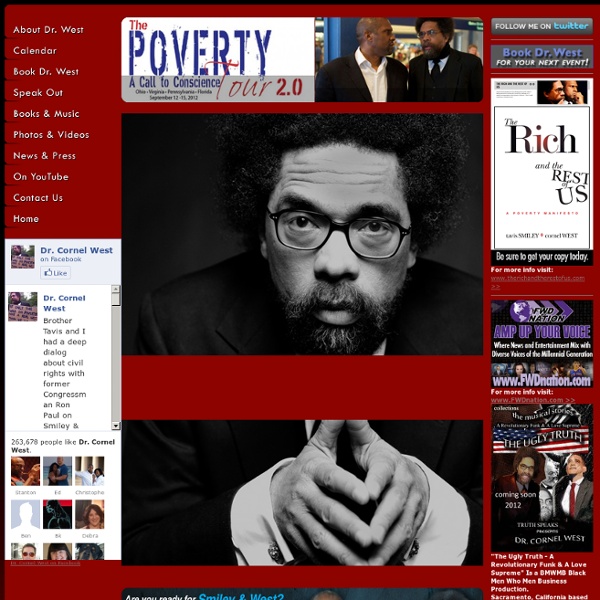



Kwame Anthony Appiah Cornel West and the Fight to Save the Black Prophetic Tradition - Chris Hedges Cornel West and the Fight to Save the Black Prophetic Tradition Posted on Sep 9, 2013 By Chris Hedges There is an insidious and largely unseen effort by the White House to silence the handful of voices that remain true to the black prophetic tradition. “Jeremiah Wright was the canary in the mine,” West said when we met a few days ago in Princeton, N.J. “The black prophetic tradition has been the leaven in the American democratic loaf,” West said. The tradition is sustained by a handful of beleaguered writers and intellectuals, including Glen Ford and his Black Agenda Report, James Cone, Carl Dix, Bruce Dixon, Boyce Watkins, Yvette Carnell, Robin Kelley, Margaret Kimberley, Nellie Bailey, the Rev. “Obama is the highest manifestation of the co-optation that took place,” West said. “He is a shell of a man,” West said of Obama. “The most pernicious development is the incorporation of the black prophetic tradition into the Obama imperial project,” West said. New and Improved Comments
Michael Hardt Early life and education[edit] During college, he worked for various solar energy companies.[2] Hardt also participated, after college, in the Sanctuary Movement[2] and later helped establish a project to bring donated computers from the United States and put them together for the University of El Salvador. Yet, he says that this political activity did more for him than it did for the Salvadorans.[2] In 1983, he moved to Seattle to study comparative literature at the University of Washington.[2] While there, he received an M.A. in 1986 and his PhD in 1990.[5] From there he went to Paris where he would meet Negri. Hardt speaks fluent French, Spanish and Italian and is Professor of Literature and Italian at Duke University and a Professor of Philosophy and Politics at the European Graduate School in Saas-Fee.[3] Thought[edit] Hardt is concerned with the joy of political life, and has stated, "One has to expand the concept of love beyond the limits of the couple Publications[edit] Books Articles
Slavoj Zizek Slavoj Žižek, Ph.D., is a senior researcher at the Institute of Sociology, University of Ljubljana, Slovenia, and a visiting professor at a number of American Universities (Columbia, Princeton, New School for Social Research, New York University, University of Michigan). Slavoj Žižek recieved his Ph.D. in Philosophy in Ljubljana studying Psychoanalysis. He also studied at the University of Paris. Slavoj Žižek is a cultural critic and philosopher who is internationally known for his innovative interpretations of Jacques Lacan. Slavoj Žižek was born into a family of average wealth, his father Jože Žižek grew up in eastern Slovenia and worked in economics. The Marxist Slovenian philosopher Božidar Debenjak was an early influence on Slavoj Žižek. Slavoj Žižek was hired at the University of Ljubljana in 1971 where he worked as an assistant researcher. Slavoj Žižek wrote the introduction to John Lee Carre and G.K.
Paul Virilio Paul Virilio (born 1932) is a French cultural theorist and urbanist. He is best known for his writings about technology as it has developed in relation to speed and power, with diverse references to architecture, the arts, the city and the military. Biography[edit] Since 1998, Virilio is only teaching intensive seminars at European Graduate School.[1] His latest projects involve working with homeless groups in Paris and building the first Museum of the Accident. Theoretical arguments[edit] The war model[edit] Virilio's predictions about 'logistics of perception' - the use of images and information in war - (in War and Cinema, 1984) were so accurate that during the Gulf War he was invited to discuss his ideas with French military officers. The integral accident[edit] Virilio believes that technology cannot exist without the potential for accidents. Dromology[edit] ‘Dromos’ is the Greek noun for road, but Virilio takes it to mean the activity of race (Virilio 1977:47). War of movement[edit]
Ludwig Wittgenstein 1. Biographical Sketch Wittgenstein was born on April 26, 1889 in Vienna, Austria, to a wealthy industrial family, well-situated in intellectual and cultural Viennese circles. In 1908 he began his studies in aeronautical engineering at Manchester University where his interest in the philosophy of pure mathematics led him to Frege. Upon Frege's advice, in 1911 he went to Cambridge to study with Bertrand Russell. Russell wrote, upon meeting Wittgenstein: “An unknown German appeared … obstinate and perverse, but I think not stupid” (quoted by Monk 1990: 38f). During his years in Cambridge, from 1911 to 1913, Wittgenstein conducted several conversations on philosophy and the foundations of logic with Russell, with whom he had an emotional and intense relationship, as well as with Moore and Keynes. In the 1930s and 1940s Wittgenstein conducted seminars at Cambridge, developing most of the ideas that he intended to publish in his second book, Philosophical Investigations. 2. 3.